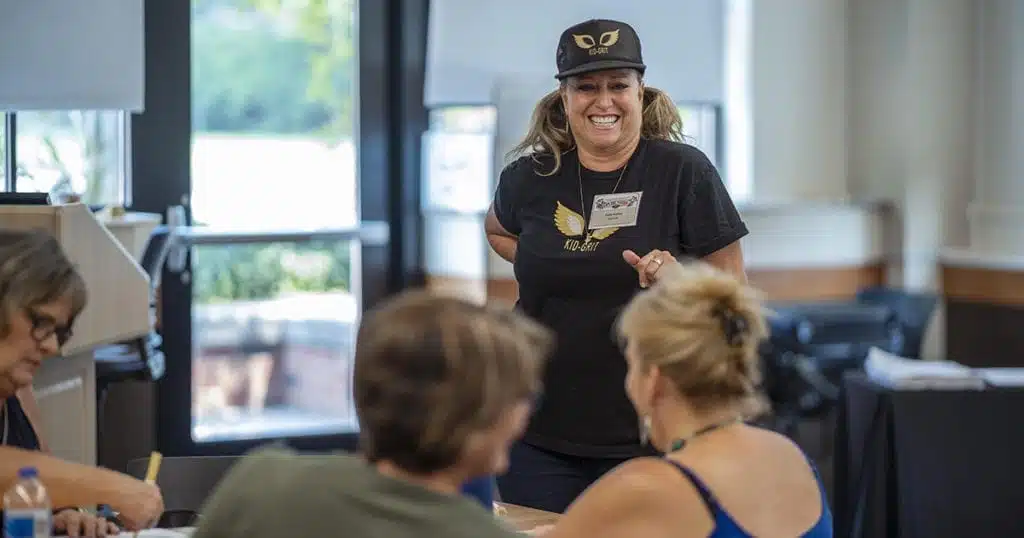

The kid-grit collective is passionate about equipping educators and students with the tools needed for success. Our innovative, mindful approach builds confidence & character, resilience & social-emotional learning, self-care & wellness.
The kid-grit curriculum is the perfect combination of social-emotional learning, mindfulness, character education, and youth development. We offer a 25-hour, inquiry-based, Pre-K-12 program, focusing on mind, body, community/connection, digital and social media awareness, and 21st-century skills.
Concurrently, we support educators and program staff with robust professional development workshop trainings based on the same foundational modules of mind, body, community/connection, and digital consciousness & balance.
We are committed to this equitable approach to social-emotional learning for both your students and staff. As a result, when educators facilitate the kid-grit curriculum in classrooms or programs, there will be no disconnect.
kid-grit™ is grounded in seminal research, Building Blocks for Learning (Stafford-Brizard, K., 2016) which provides educators a framework for working with students. This framework calls out measures of healthy development, school readiness, mindsets for self and school, perseverance and independence and sustainability, as critical to the development of the whole child. At kid-grit we wholeheartedly agree! Young people need a progressive, multi-tiered approach to develop a life leading to improved performance on all school and academic measures.
kid-grit™ is a holistic approach to creating a well-rounded student. The curriculum is focused and committed to a developmental approach promoting the nourishment of a child’s intellect, emotion, and intuition, along with conditioning his/her body through delicious nutrient-dense food, movement, and breathing. In this way, we can holistically impact the whole child. By developing the mind through mindfulness and mindset, strengthening the body through nutrition and exercise, fueling connectivity through community involvement and teamwork, and nurturing skills around social media and technology usage, we will increase students’ awareness, connection to others, and commitment to the mental, physical, emotional, and communal aspects of their growth. Our concepts and activities will help students build their personal resilience and grit to become positive and productive contributors in their personal and professional lives. All of these elements are integrated to create a holistic model for today’s youth. This approach focused on the whole child has a variety of well-documented and researched impacts including seminal research on the Building Blocks for Learning (Stafford-Brizard, K., 2016). Students will build necessary life skills in the following areas: stress-management, self-control, increased productivity, and improved attention span in academic classes, sports, and the arts. They will develop a stronger sense of self and a ‘groundedness’ — all resulting in increased school attendance, higher academic performance, and a more thoughtful and intentional young person.
The great majority of students are tasked with hours of academic rigor, focusing on result-driven content. Their minds are overloaded by technology, and there is a growing amount of research that shows there can be significant negative clinical and neurologic effects on kids brains and behaviors, (Kardaras, Nicholas, 2016) nutrient-deficient lunches or skipping important meals, reduced physical activity, and less and less time for creative expression. Students are functioning on high stress levels; unable to sustain their focus; socially and emotionally disconnected; undernourished or hyped up on poor food choices. Students, especially from low-income backgrounds, are often deprived of basic resources they need in order to navigate school and life successfully, this is a major contributor to the Achievement Gap (Stafford-Brizard, K. Brooke, 2016). At the other end of the spectrum, students from privileged backgrounds are often acting out with entitlement behaviors; they are disconnected and become isolated from their own families. In addition, most students have an unhealthy attachment to social media and digital devices — which is beginning to have a negative impact on their behavior, causing them to make unhealthy and poor decisions due to low energy, lack of focus, irritable or even volatile behavior, disinterest in their studies and their own personal growth, and a complacency towards school and their futures.
Use this curriculum! When implementing a holistic youth development program, students become more secure, more self-aware, and more empathetic. They develop positive and resilient mindsets, resulting in stronger character and the ability to use ‘grit – like’ skill sets in their day-to-day lives. They become positive contributors to their communities and develop a greater understanding of themselves and the world they live in. While we understand and are aware that we cannot completely change a student’s belief system without acknowledging that their circumstances may be challenging or undesirable, we believe that if we instill self-awareness and expose them to new perspectives, they have a higher chance of navigating their own personal situations with success.
Use this curriculum! All the lessons in this program have been designed to engage students in areas of personal development, social-emotional learning, character education, 21st-century skill-based inquiry, and global consciousness. These lessons are built to have students think critically and share perspectives — focusing on topics such as: tolerance, personal development, bullying, cyber-bullying, healthy screen time, racism, sexism, building positive communities, gratitude, self-regulation, empathy, choosing healthy foods, and using exercise as a form of stress release. Students will be challenged to think outside the box and drive their own learning — they will learn by doing. They will take on new ways of problem solving and, in the process, create their own prescription for healthier mindsets, building resilience and grit.